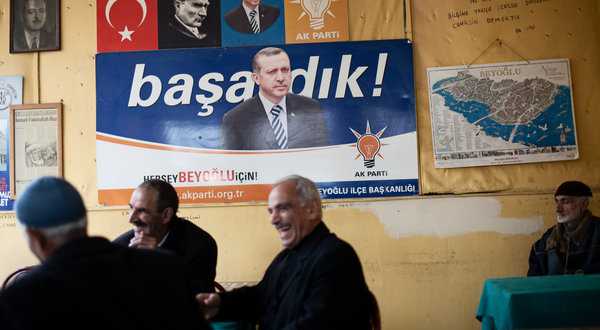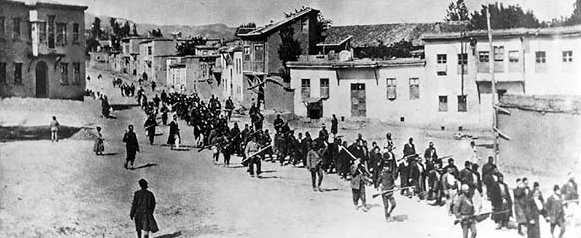By Agence France-Presse
A woman holding the Turkish and French flags takes part in a rally next to the French National Assembly in Paris. Photo: AFP.
Turkey reacted with fury Thursday to a vote by French lawmakersto outlaw denial of the Armenian genocide, immediately cutting military ties and warning of “irreparable damage” to relations.
“This is politics based on racism, discrimination and xenophobia,” thundered Prime Minister Recep Tayyip Erdogan, ordering home Ankara’s ambassador to Paris and banning political visits between the two NATO allies.
“From now on we are revising our relations with France,” he added. “There was no genocide committed in our history. We do not accept this.”
Turkey will rule on a case-by-case basis on any request made by France to use Turkish airspace or military bases and will reject any French demand for its military vessels to dock at Turkish ports, he said.
He said Turkey would boycott a joint economic committee meeting in Paris in January, a move that will worry business leaders in both countries, fearful for the fate of 12 billion euros in annual trade between the two powers.
Erdogan accused France’s President Nicolas Sarkozy of pandering to domestic voters, hundreds of thousands of whom are ofArmenian descent, and warned that these measures were the first in an escalating scale of sanctions.
“History and people will never forgive those exploiting historical facts to achieve political ends,” said Erdogan, reflecting a view of Sarkozy’s motives that is shared by many of his domestic critics.
Sarkozy’s government has insisted the law was a parliamentary idea, but it was drafted by members of his UMP party and was passed in the first of a series of votes by a small number of lawmakers in a sparsely attended house.
In Paris, Foreign Minister Alain Juppe’s office issued a statement to “express regret” over Erdogan’s decision and calling for dialogue.
“Turkey is an ally of France and a strategic partner,” Juppe said, citing work done by the states in NATO and the G20 to address the crisis in Syria, bring peace to Afghanistan and develop security in the Mediterranean.
“It is important in the current context to keep open all paths to dialogue and cooperation,” he said, having earlier urged Turkey not to “overreact”.
The National Assembly voted to approve a first reading of a law that would ban anyone from denying that the 1915 killings of hundreds of thousands of Armenians by Ottoman Turk forces amount to genocide.
Supporters argue that the law — which will impose a 45,000 euro fine and a one-year jail term on genocide deniers — is an overdue measure to protect the memory of one of the 20th century’s worst massacres.
But Turkey argues that Armenia’s estimate of 1.5 million dead is exaggerated and that the deaths were caused by World War I fighting.
The Turkish embassy in Paris said its ambassador had been recalled and would leave Friday, and angry crowds in Ankara chanted: “We have not committed genocide, we defended the homeland. Wait for us France, we will come.”
The draft law will now be debated by the Senate and parliamentary committees, and may be enacted early next year.
“We’re not trying to write history but to make an indispensable political act,” Patrick Devedjian, a lawmaker of Armenian descent, told parliament. “Now, Turkey is falling into revisionism and denies its own history.”
The debate was held under tight security, after around 4,000 Turkish expatriates living in France gathered outside parliament to protest.
France is home to around 500,000 citizens of Armenian descent and they are seen as a key source of support for Sarkozy and the UMP ahead of presidential and legislative elections in April and June next year.
Sarkozy’s main opponent in the upcoming vote, Socialist flag-bearer Francois Hollande, denounced the genocide bill as a cynical “electoral operation” and predicted it would never clear both houses of parliament before the vote.
Armenians say up to 1.5 million of their forebears were killed during World War I by the forces of Turkey’s former Ottoman Empire.
Turkey disputes the figure, arguing that only 500,000 died, and denies this was genocide, ascribing the toll to fighting and starvation during World War I and accusing the Armenians of siding with Russian invaders.
Franco-Turkish relations are often tense — Sarkozy is a firm opponent of allowing Turkey to join the European Union — but 1,000 French firms work there and trade between the two is worth 12 billion euros per year.
Much of Europe, including France, is facing recession amid a sovereign debt crisis, but Turkey enjoys growth rates in excess of eight percent and, with 78 million people, it is a huge potential market.
Agence France-Presse
Agence France-Presse
AFP journalists cover wars, conflicts, politics, science, health, the environment, technology, fashion, entertainment, the offbeat, sports and a whole lot more in text, photographs, video, graphics and online.
via Turkey cuts some ties with ‘racist’ France over genocide law | The Raw Story.





